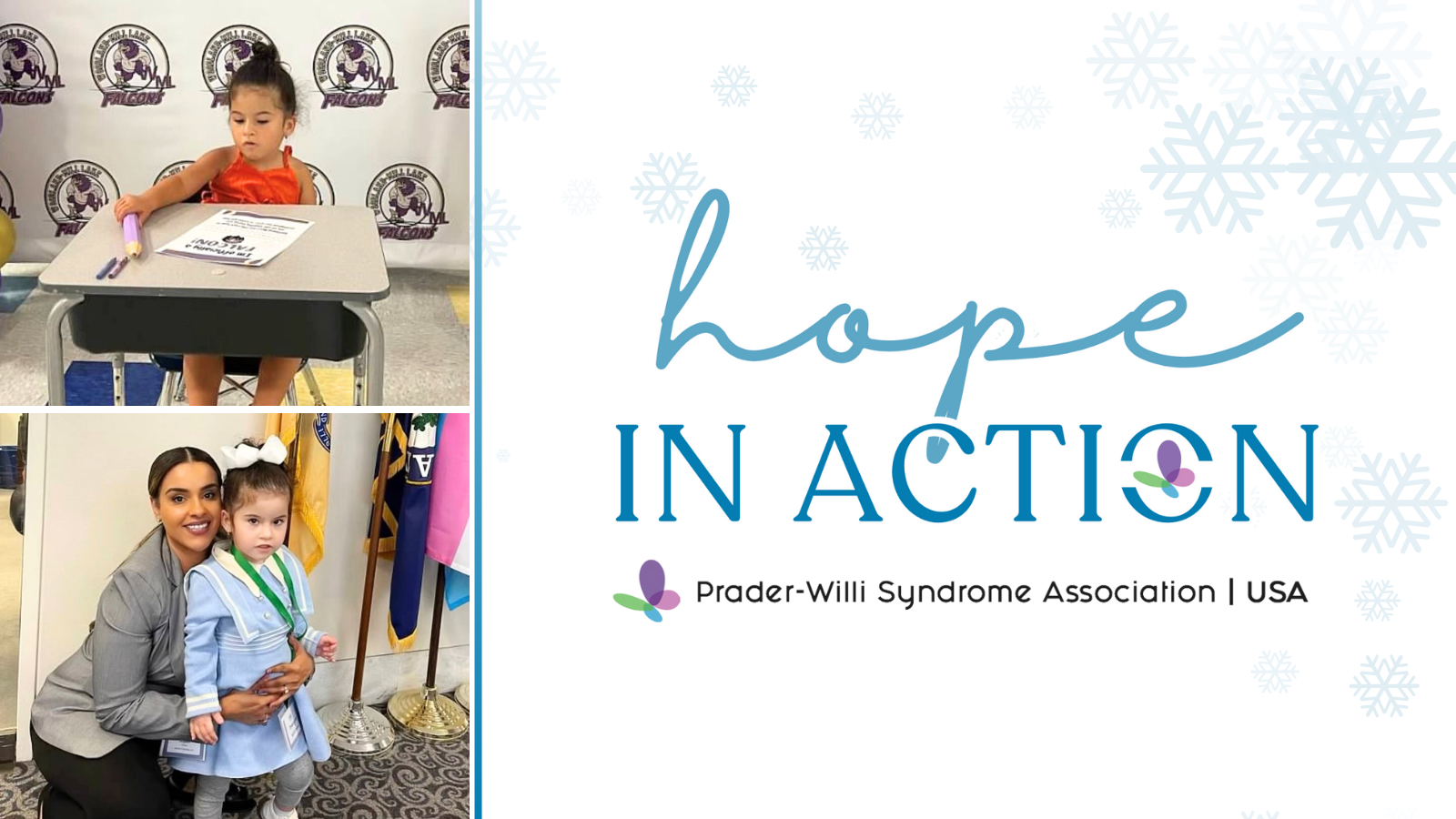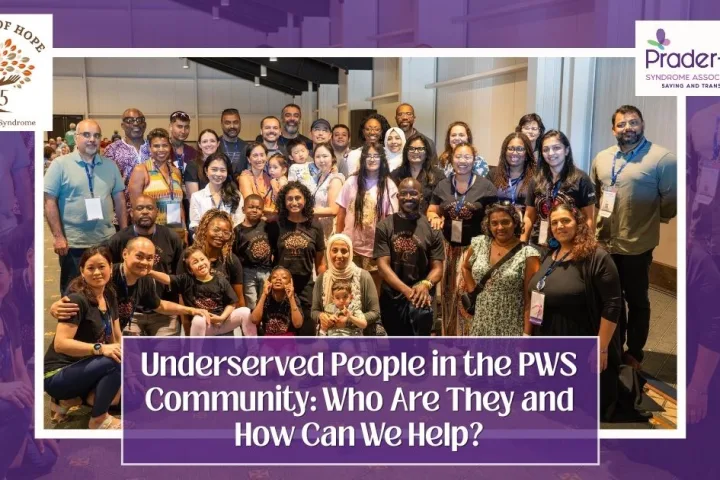At PWSA | USA, we recognize that success in school for individuals with Prader-Willi syndrome (PWS) involves more than academic support. It requires a network of dedicated assistance to meet each student’s unique needs. This is where we come in, helping families navigate the often-challenging education system to ensure their children receive the support they deserve.
When Sue Colon’s daughter, Shealynn (4), entered preschool, Sue faced the Individualized Education Program (IEP) process for the first time. “I was new to the IEP world,” Sue shares. “I had a very limited understanding of what IEPs are, what my rights are, and what my daughter’s rights are. I like to say, ‘I was lost in the sauce.’” Sue reached out to PWSA | USA and was connected with CEO Stacy Ward, MS, BCBA, a guiding hand during this complex process.
“Stacy was phenomenal,” Sue reflects. “She helped me understand my rights as a parent and a special needs parent, what I could request, and what to expect in an IEP meeting. She even attended the meeting with me because I had certain special requests.”
For Stacy, supporting families through moments like these is a meaningful way to help ensure that individuals with PWS receive the support they need to thrive in school. “Sue did give them a heads-up that I was coming, and to be honest, I felt as if there was nothing I said to her school team that Sue hadn’t already said about Shea’s needs and the safety concerns,” she explains. “What was different was that I was coming at it from a professional standpoint, not as a parent. ”
This approach made a profound impact. “We got a one-on-one aide in place immediately,” Stacy says. “They were willing to do just about anything we asked to ensure Shea’s safety while allowing her to grow and be challenged.”
Sue describes the importance of having an advocate with her in the meeting. “It meant the world to us to have someone there who was credible. As a parent, when discussing our kids, IEPs, or health concerns, we can get emotional, and it can feel like not everything is being fully heard. Stacy was the middle person, helping the message get through more clearly and educating them about PWS, which is a complex syndrome. It was very empowering.”
Through PWSA | USA’s School Success Program, our family support team offers advocacy, guidance, and a powerful support system for families. This program helps parents and caregivers navigate IEPs, secure necessary accommodations, and empower them to advocate effectively for their loved ones.
“My hope for families is that they feel empowered to advocate for their child with our support backing them up,” Stacy explains. “I love being able to help and be the voice for parents, but I also want them to feel empowered to do that as well.”
Sue’s story is one among many where PWSA | USA has stepped in to help a family when they needed it most. For families with a loved one living with PWS, the school process can be daunting. That’s where PWSA | USA makes a difference, helping parents walk into school meetings with confidence and a clear understanding of their child’s needs.
“Our family support team is here from the beginning,” says Stacy. “Whether transitioning from early intervention to the school district for services, drafting an IEP, or reviewing goals and assessments, we are there to support families every step of the way.”
For 50 years, PWSA | USA has been guiding families through some of their toughest moments. Whether advocating for school success, supporting medical challenges, or providing emotional assistance, PWSA | USA stands as a trusted partner, helping families and individuals affected by PWS thrive.
“Having PWSA | USA and other PWS families to lean on has been the greatest gift I could have received,” Sue shares. “I want to thank everyone who’s donated to PWSA | USA. We’ve relied on their services for so much—from IEP support to navigating medical challenges.”
Your support for PWSA | USA goes beyond a simple donation—it empowers families and gives hope. As Sue says, “Your donation is going to impact and change people’s lives on a daily basis the way it has mine.”
To support families like Sue’s, you can contribute to the 2024 Angel Drive by visiting https://www.pwsausa.org/angel-drive-2024/. Together, we can continue turning hope into action for every family impacted by PWS.
Share this!





 Perry A. Zirkel has written more than 1,500 publications on various aspects of school law, with an emphasis on legal issues in special education. He writes a regular column for NAESP’s Principal magazine and NASP’s Communiqué newsletter, and he did so previously for Phi Delta Kappan and Teaching Exceptional Children.
Perry A. Zirkel has written more than 1,500 publications on various aspects of school law, with an emphasis on legal issues in special education. He writes a regular column for NAESP’s Principal magazine and NASP’s Communiqué newsletter, and he did so previously for Phi Delta Kappan and Teaching Exceptional Children. Jennifer Bolander has been serving as a Special Education Specialist for PWSA (USA) since October of 2015. She is a graduate of John Carroll University and lives in Ohio with her husband Brad and daughters Kate (17), and Sophia (13) who was born with PWS.
Jennifer Bolander has been serving as a Special Education Specialist for PWSA (USA) since October of 2015. She is a graduate of John Carroll University and lives in Ohio with her husband Brad and daughters Kate (17), and Sophia (13) who was born with PWS. Dr. Amy McTighe is the PWS Program Manager and Inpatient Teacher at the Center for Prader-Willi Syndrome at the Children’s Institute of Pittsburgh. She graduated from Duquesne University receiving her Bachelor’s and Master’s degree in Education with a focus on elementary education, special education, and language arts.
Dr. Amy McTighe is the PWS Program Manager and Inpatient Teacher at the Center for Prader-Willi Syndrome at the Children’s Institute of Pittsburgh. She graduated from Duquesne University receiving her Bachelor’s and Master’s degree in Education with a focus on elementary education, special education, and language arts. Evan has worked with the Prader-Willi Syndrome Association (USA) since 2007 primarily as a Crisis Intervention and Family Support Counselor. Evans works with parents and schools to foster strong collaborative relationships and appropriate educational environments for students with PWS.
Evan has worked with the Prader-Willi Syndrome Association (USA) since 2007 primarily as a Crisis Intervention and Family Support Counselor. Evans works with parents and schools to foster strong collaborative relationships and appropriate educational environments for students with PWS. Staci Zimmerman works for Prader-Willi Syndrome Association of Colorado as an Individualized Education Program (IEP) consultant. Staci collaborates with the PWS multi-disciplinary clinic at the Children’s Hospital in Denver supporting families and school districts around the United States with their child’s Individual Educational Plan.
Staci Zimmerman works for Prader-Willi Syndrome Association of Colorado as an Individualized Education Program (IEP) consultant. Staci collaborates with the PWS multi-disciplinary clinic at the Children’s Hospital in Denver supporting families and school districts around the United States with their child’s Individual Educational Plan. Founded in 2001, SDLC is a non-profit legal services organization dedicated to protecting and advancing the legal rights of people with disabilities throughout the South. It partners with the Southern Poverty Law Center, Protection and Advocacy (P&A) programs, Legal Services Corporations (LSC) and disability organizations on major, systemic disability rights issues involving the Individuals with Disabilities Education Act (IDEA), Americans with Disabilities Act (ADA), and the federal Medicaid Act. Recently in November 2014, Jim retired.
Founded in 2001, SDLC is a non-profit legal services organization dedicated to protecting and advancing the legal rights of people with disabilities throughout the South. It partners with the Southern Poverty Law Center, Protection and Advocacy (P&A) programs, Legal Services Corporations (LSC) and disability organizations on major, systemic disability rights issues involving the Individuals with Disabilities Education Act (IDEA), Americans with Disabilities Act (ADA), and the federal Medicaid Act. Recently in November 2014, Jim retired.